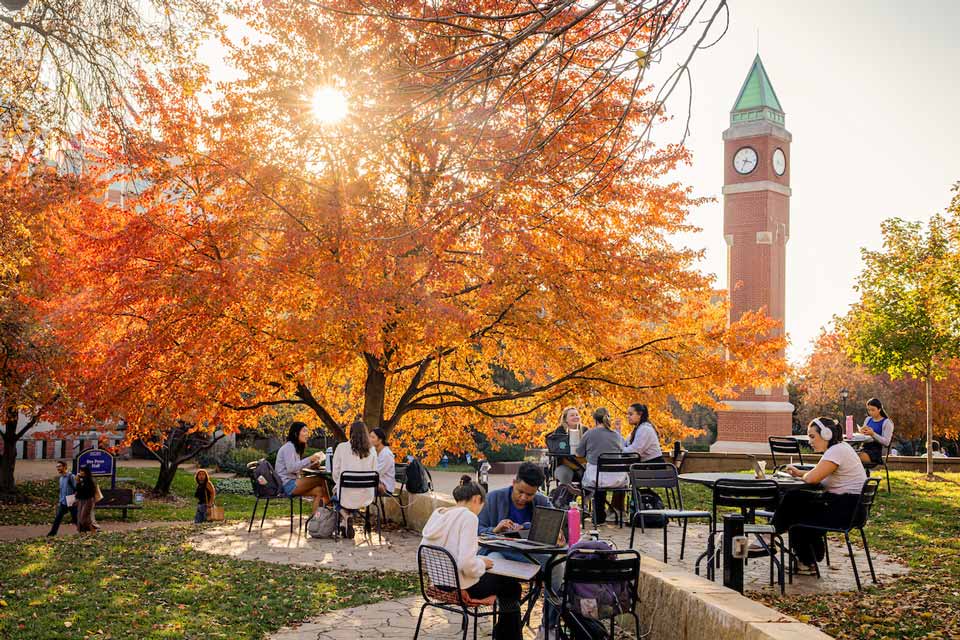Billiken Bulletin Newsletter
This is the most recent issue of the Billiken Bulletin, a monthly electronic newsletter that provides resources to help you as a Saint Louis University family member navigate campus and provide direction to your students when they are unsure about where or how to find the information on campus.
Can you believe we are already in November and preparing for another holiday and another month to be thankful for our lives and families? Now that students have experienced midterms and are now preparing for finals, this publication is dedicated to helping you understand the registration process, SLU grading system, FERPA and how you as a family member can submit documentation for financial aid.
The Office of Parent and Family Engagement is now on Instagram. Please follow us at @slufamily.
The past few years have presented unprecedented challenges to students and universities as together, we have navigated a post-pandemic era, massive changes to the FAFSA and a challenging economic environment. During these times, SLU, like so many other universities, relaxed policies related to past-due balances and registering for classes.
With this in mind, and to help students and families make the best financial decisions for their particular circumstances, we are reinstating payment expectations and hold policies concerning outstanding balances.
Read specific information on holds
We know the financial aid and payment process can be challenging to navigate. Student Financial Services is here to help families understand all the financial aid and payment agreement options available.
A federal privacy law (FERPA) restricts parents’ access to their student’s academic and other educational records (even when parents are paying the bills!). SLU offers parents two different FERPA-compliant ways to see or otherwise access their students’ grades (mid-term and final), their course schedules, and other key data. Here’s a brief overview of each:
Banner Proxy
“Banner” is SLU’s main student information system, containing your student’s course schedule, grades, etc. Parents can gain special 24/7 access to such key academic data in Banner if their students set up a “Banner Proxy” account for them.
- Banner Proxy allows students to designate another individual (a proxy) – typically one or more parents, but could also be others – to access certain aspects of their student records within the Banner system.
- Each parent/proxy has their own login credentials and permissions within the Banner system, allowing them to view information as authorized by the student.
- The student can set permissions for the proxy, specifying what information or actions the proxy is allowed to access or perform.
Students can set up any parent’s Banner Proxy access via a related system called “Banner Self-Service” (which they should be very familiar with). If your student isn’t aware of how to set up Banner Proxy access, the can find instructions on the registrar's website or contact the Office of the Registrar.
Student Consent of Disclosure of FERPA Records
FERPA does allow students to sign a consent form that enables SLU staff to share FERPA-protected education records with parents or guardians, or other “third parties” as designated by the student. Typically this type of record sharing between SLU and parents happens via e-mail or phone calls between parents and SLU staff (and often including students themselves) when more serious academic, behavioral, or health issues arise.
- Having a completed, signed Student Consent of Disclosure of FERPA Records on file at SLU and “at the ready” speeds up the process of SLU sharing FERPA-protected education records with families – which is particularly important in times of crisis. Students may sign this form at any time, and it will remain in effect for as long as the student is enrolled at SLU (or until the student formally rescinds their consent).
Both Banner Proxy and the Student Consent of Disclosure of FERPA Records serve similar purposes in terms of granting access to parents, guardians, or other third parties – but they operate within different contexts and systems. The Student Consent of Disclosure of FERPA Records is more generalized and applies to all educational records covered by FERPA, while Banner Proxy only provides access to key education records in the Banner system.
Mid-term grade season is upon us – and that means many families/guardians have questions about various grade designations that SLU uses. Students might also have questions about what the short and long-term impacts are of a student’s decision to withdraw from a course. Below we address both issues:
SLU’s Grading Scheme
SLU uses a fairly standard grading scheme, featuring typical letter grades: A+, A, A-, B+, B, B-, C+, C, C-, D, and F). Note that we use “+/-“ grades only at the A, B, and C levels (although only the School of Law uses the “A+” grade); we don’t assign “+/-“ grades to grades of D or F. All of these grades are part of term and cumulative University GPA calculations.
We also use an additional, special kind of “F” grade – the “FQ” grade – to indicate that, at some point in the term, the student stopped attending/participating in the course without formally withdrawing from it (see the note on course withdrawal below).
For courses numbered below 1000 (essentially “pre-college” courses), all grades will be preceded by a period, such as “.B-“; that tells our data system to exclude that grade from University grade point average (GPA) calculations.
Finally, for certain courses we also award grades of “P” (for “Pass”), “NP” (for “No Pass”), “S” (for “Satisfactory”) and “U” (for “Unsatisfactory”). All of these grades are excluded from University GPA calculations.
For details about our full grading system, please see our Grades and Grading System web pages.
Guidance on Withdrawing from a Course
It’s an age-old conundrum for students: Stay in a course in which they’re struggling and risk a questionable grade (typically a D or F)? Or formally withdraw, resulting in no grade, no credit hours and no impact on their GPA, with only a designation of "W" on their transcript. Unfortunately, there’s no “one size fits all” answer.
For some students, a grade of “C” or even “B” is a shock, perhaps something they never experienced in high school and can’t imagine having on their college record. But SLU students, and students throughout higher education in America, still earn “C” grades. For most students, we encourage them to stay in their courses unless their struggles are significant, and getting a “C” grade is typically not that significant a concern.
However, some courses do require, as a prerequisite, the completion of an earlier course with a grade above a specific level (i.e. C+ or even B-). Likewise, some programs do not allow withdrawals at all, regardless of the student’s grade. Students need to consult with their instructor and academic advisor before making these decisions.
In some cases, students with plans to enter highly competitive graduate or professional degree programs might be advised to withdraw from certain courses to “protect” their GPAs, though they are often advised to retake those courses later to master the content. For other students, a series of concerning grades can be a sign that the academic major requiring those courses might not be the best fit for the students – but that depends on many factors. While a couple of withdrawn courses on a student’s entire academic transcript is not unusual and often not a concern, multiple withdrawals across multiple terms might send warning signals to potential employers or graduate schools.
Families should be aware that some course withdrawal decisions can have financial implications. Tuition refunds are dictated by the timing of the withdrawal, and if federal financial aid was used to pay the tuition there are other implications. Withdrawals might also impact athletic eligibility or other benefits tied to students being enrolled, minimally, in a full-time load of courses (at least 12 credits per fall/spring semester).
For details on course withdrawals (and their implications), please consult the Dropping or Withdrawing from Courses page in our online University Catalog.
The best advice for every student considering a course withdrawal is this: They should always talk with their instructor and academic advisor about their course performance and enrollment options.
Spring semester registration for Billiken Students takes place in November.
Visit the registrar's website for important steps that your Billiken should consider when preparing for class registration.
SLU Senior Rhema Briggs’s October article from The University News covers the building excitement in the SLU community with the arrival of new men’s head coach Josh Schertz. This piece details how, after a tough 23-24 season, Schertz brings a fresh vision to the Billikens following an impressive run at Indiana State University. Schertz emphasizes not only winning but also cultivating a positive team culture and holistic player development. With a blend of returning players, new transfers, and recruits, he faces the challenge of molding this diverse roster into a cohesive unit.
Members of our SLU Women’s Basketball team, alumnae Peyton Kennedy and Kennedy Calhoun earned preseason Atlantic 10 All-Conference honors, announced by the league in conjunction with Media Day in Washington, D.C., sparking enthusiasm for when their season kicks off on Nov. 4 at South Dakota.
Sarah Adam, an assistant professor at SLU, made history as the first woman to play on the U.S. wheelchair rugby team. Her efforts helped Team USA win silver at this summer’s 2024 Paralympic Games in Paris. Not only does Sarah inspire and lead on the court, but she is also shaping the next generation of medical professionals at Saint Louis University as an assistant professor of occupational science and occupational therapy. We were excited to have this SLU representation at the Olympics.
It’s not too late to join one of the Family Networks in your state. Participation allows you to fellowship with other Billiken Families who live nearby. It’s very easy to do: Just fill out the Family Network Form. If you are interested in volunteering, please fill out the BPFA Volunteer Interest Form.
The goals of the Family Networks are:
- Enhance communication between the University and families of SLU students;
- Develop a community as a resource for the university;
- Share input and support student initiatives;
- Assist the SLU administration in identifying and encouraging parents, families and others to support the mission of the university; and
- Most importantly, to have fun!
Northeast Region
Connecticut, Delaware, Maine, Maryland, Massachusetts, New Hampshire, New York, Pennsylvania, Rhode Island, Vermont and Washington D.C.
- Briana Banks
- Subrahmanyan Boddu
Great Lakes Region
Indiana, Michigan, Ohio and Wisconsin
- Julie Wilborn
Gateway Region
Central and southern Illinois and Missouri
- Mary (Peggy) Lewis
Windy City Region
Chicagoland area
- Jill and Gerald Tisdale
- Marciela Delgado
Southern Region
Alabama, Arkansas, Florida, Georgia, Louisiana, Mississippi, South Carolina and Texas
- Mary Saffell
Cumberland Region
Kentucky, Tennessee, North Carolina and West Virginia
- Yasmin Blurchian
Great Plains
Iowa, Kansas, Nebraska, North Dakota, Oklahoma, South Dakota and Minnesota
- Ana Schmidt
Pacific Crest
Alaska, Arizona, California, Colorado, Hawaii, Idaho, Montana, Nevada, New Mexico, Oregon, Utah, Washington and Wyoming
- Harsha Bhanshali
Housing and Residence Life recently shared their newsletter with our Billikens. Get all the updates and Housing Reminders and facilities updates as we prepare for Housing.




















